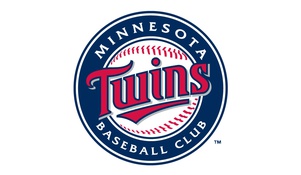The Tricky Game of Texas Hold'em Poker: Can you really make money at it?
Crunching the Numbers on “The Cost of Playing Poker”
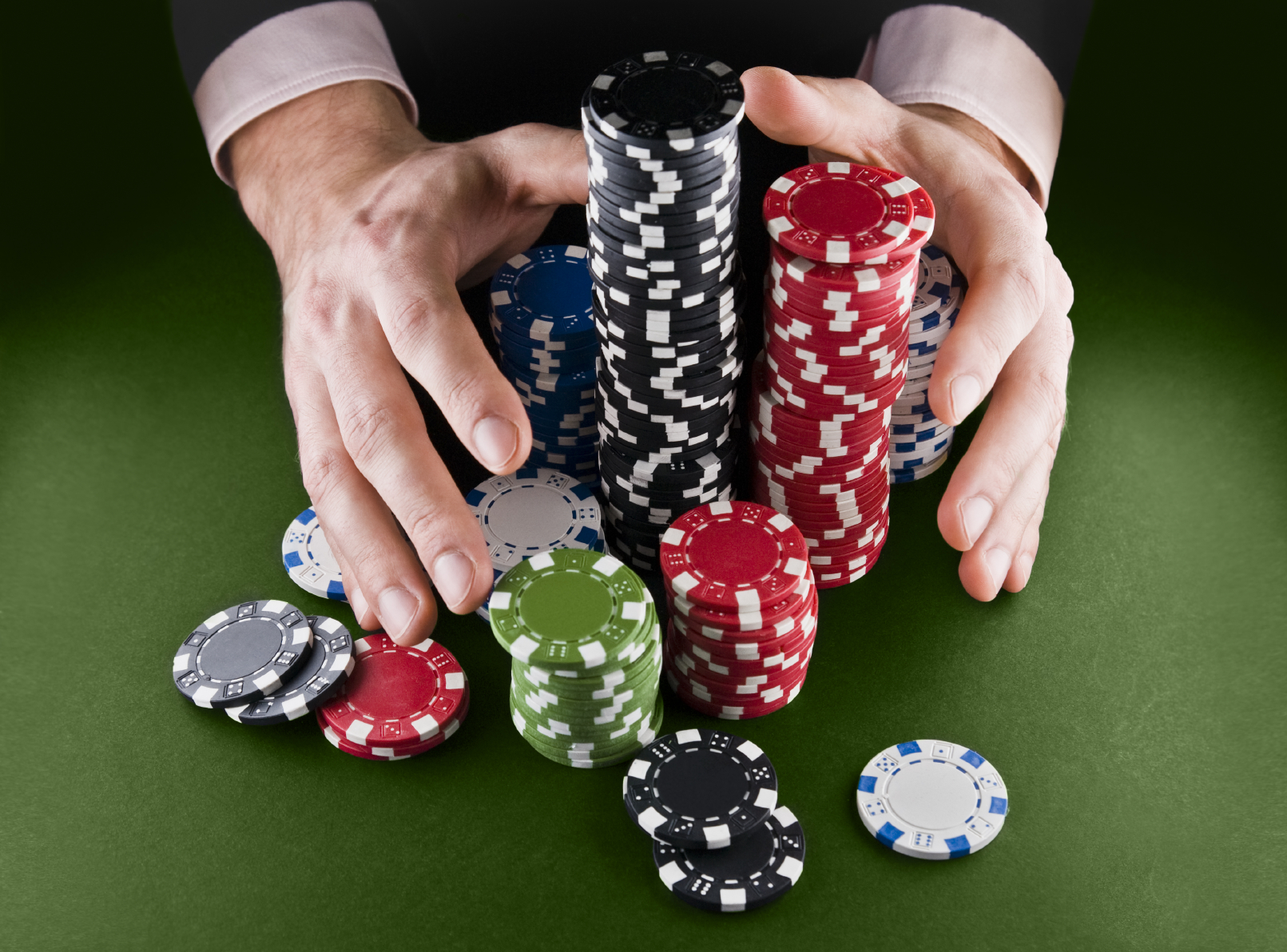
Can you be a winning poker player? The short answer is no. The smart answer is no. The realistic answer is no. There's about a 90-95% failure rate. But like Rocky Balboa chasing a chicken and as Jim Carey once said, "so you're telling me there's a chance".
There are poker players who do make a living or consistent money, but statistics say about a minute 5-10% of players sustain this over a 3+ year span. I'll attempt to show the absolute difficulties a player is up against if they want to try to grind out some money. I'm strictly talking average numbers, no strategy, pot odds, expected value, out draws and all the other factors to try and beat the game. I am also talking a live player who goes to a casino and plays in a game, not the online maniacs who play 10-20 tables at a time. This is geared towards limit hold'em for the Average Joe who comprise the poker majority. Poker professionals, and no limit players, hold your water because I know some of you will be yelling at the screen. No Limit can sometimes be averaged but the variance is harder to calculate without knowing the type of players and action in the game.
For the purposes of simple math I am going to use $5-$10 limit hold‘em as a median example. Almost all players begin with and continue to play at low limit hold’em ($2-$4 or $3-$6) and some more experienced players at higher ($15-$30 or $20-40). $5-$10 is a good median rate. I’ll put an appendix on the end to give some examples of higher and lower limits.
The skill level will be from an above average, solid, player perspective. This type of player knows what/when to play, when to fold/raise, how to read hands and has overall solid skills in the game. The averages being factored are based on generalized mean or averaged data off my research and playing experience.
One important term to mention is variance. Variance is a change away from the average in poker. It includes the effects of luck in poker, both good and bad like “going on a hot/cold streak”. It includes the changing size of pots, pace of the game, number of players at the table, raising action or lack off in the game and so on. Variance in hold'em is a given and could sway as much 20-40% in a negative or positive direction, it is what drives players away, but keeps them coming back. 30% will be the averaged variance. It’s also perhaps what makes this article a lesson in futility as it’s just so hard to make any numbers stick. But let’s give it a try anyway. My go to answer is going to be overall average, meaning if a player keeps playing for years it’s where will the averages take them.
Let's get down to the nitty gritty. The old saying that it takes money to make looms large in poker. Poker players know it costs money to play poker, a term used as bankroll to poker players. How much money it costs just to play the game may be quite surprising. The win rate to just break even can also be a sobering realization on poker.
As a player in a casino poker room, there are 4 fixed or playing costs in limit hold em I’ll factor in.
1) Blinds Cost (BC) = the cost of the blinds
2) Rake Cost (RC) = the cost of the table rake/jackpot/promotions
3) Dealer Cost (DC) = the cost of the dealer’s tips
4) Continuing Cost(CC)= the cost required to stay in the hand
Than I’ll factor in 2 asset classes
1) Win rate per hour (WRPH) = pots won per hour
2) Avg Pot Size (APS) = average amount of money in the pot
So if we want to make this a little more fun and look at as algebra equation it would go something like this:
(WRPH*APS)-(BC+RC+DC+CC)= x x=total profit per hour
Rate of Hands Played per Hour
We can try to estimate the hourly cost of poker by first counting the number of hands played per hour in a game of casino poker. Based upon the efforts of a skilled dealer, one could expect to see 25-35 hands per hour. The variation in dealing rates can change. This variation in hands, per hour, is predominantly the result of the players at the table. Some players have the innate ability to slow a game down, by slow rolling hands, not acting in turn, splashing chips into the pot, calling time outs or deck changes, and generally by not paying attention to the game. The skill of the dealer, although secondary to players’ delaying actions, may also affect the rate at which hands are dealt, including the speed of the dealer’s pitch, their hand recognition skills, ability to split up pots, etc. To make our average let’s call it 30 hands per hour.
Flops Seen per Hour
A solid player in poker is going to fold about 70-80% of the time. If a solid player plays at the rate of about seeing 25-36 hands per hour, has to play at least 3 blinds, it’s likely they’ll see about 7-13 flopped hands. A nice average is 10 hands flopped in an hour. A good player will win about 15-30% of the flops they see, which we'll take a closer look at shortly.
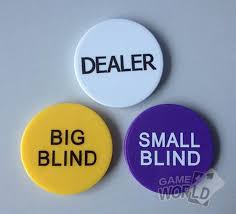
Calculating the Blinds Cost:
Blinds cost are an obvious expense in poker, but how much do they run? Are they cheap, or are they expensive over the long run? Let’s take a look.
30 hands per hour will equal 3 round trips of blinds in a 10 handed game. So at a minimum a player will have to play the blinds 3 times per hour. If you're at a 6 handed table you're looking at about a 6 round trips of blinds as hands will play faster. We have to factor in some variance, blinds get raised around 50% of the time, sometimes (many times) players play instead of fold the small blind.
Using the hourly minimum cost of 3 round trip blinds per hour, $21/hour is the absolute minimum for a $5-10 game, assuming you fold the small blind. If you play all small blinds the minimum cost would be $30/hour. A 6 handed game would double the minimum blinds costs up $42 to $60 per hour. 30% variance factors could push our costs up to around $54-$78/hour. All things considered let’s average in $45 as our blinds costs per hour.
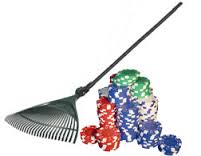
The Table Rake
In addition to the blinds, poker players must also pay a table rake. The table rake is the money the house takes out of each pot as their fee for running the game. Chips are pulled out the pot by the dealer, and then dropped down a slot in the table. Usually there are two slots, one for the house and one for promotional contributions. These dropped chips collect in boxes next the table by the dealer. These chips constitute the table rake. The rake is a big factor in poker as it means there’s automatically less money coming out of the pot then went into it. There will be anywhere from $3-$7, depending on pot size, “raked” from the pot. Generally speaking, on average a player can expect to pay $1 to the rake per hand played. We’ve established a solid player plays at the rate of seeing about 10 hands flopped in an hour. Therefore, an average cardroom patron will pay the rake 10 times in a hour or an average $10 per hour as table fees.
Another, maybe simpler, way to factor rake is by hands won. As the player really that's where the rake effects us, as we get to collect money. If the average rake is $5 out of pot and a player won 2 pots in an hour that would be $10 lost to the rake. 3 pots would be $15 and so on.
The rake can be the main reason so few players will ever show a long-term profit. Why? Say you sat down with $100 and hypothetically only paid the rake, $10 an hour. 10 hours later you’re headed home not ever being beat, and down a honey bee ($100) The rake takes away profit!
The Cost of Tipping the Dealers
Using similar logic as above, if an average card room patron plays 10 hands in an hour, winning the average range of 15-30%, meaning 2-3 pots per hour. If the player tips a customary house-tip ($1-2 for an average pot), than an average cardroom patron will tip 2-3 times per hour, so we’ll average in at $5 per hour in tips.
The Continuing Cost of Playing the Hand
This is where variance plays a huge factor, but on average we’ll go back to what a solid player would do to figure our continuing bet costs (CC) per hour. A CC bet will be the equivalent of 1 big bet, ie $10 in a $5-$10 game. A solid player will not play all hands to the river as they know they’re beat and will fold.
If solid players are playing 20-30% of the 30 hands seen in an hour that will factor to about 7 (not including blinds) hands per hour with a little variance. Preflop bets will aver 3CC. A good player will probably fold after the flop on 1 or 2 of them, factoring in a raise or 2 let’s call it 3 CC bets. Let’s factor in folding 1 or 2 more hands on the turn and adding 5 more CC bets. That leaves 4 showdown hands to the river, which is about 3CC bets if we factor in variance with some raises. All totaled that’s 25 CC bets per hour. Poker savants are probably going nuts as I try to put a number on this but remember it’s an average (likely a modest one) and variance is huge, but we’re trying to play the averages.
25 CC bets per hour x $10= $250 per hour
Totaling Up the Hourly Cost of Playing Poker
Crunching the numbers with regard to the cost of playing poker in a casino cardroom. In total, an average poker $5-$10 limit hold'em player will pay:
$45BC+$10RC+$5DC+$250CC= $310 Total Average Hourly Cost
These numbers are obviously not set in stone and there’s a lot of variance in each category. Before we pack the pack the bags and head home let's look at the assets or winning side of the game.
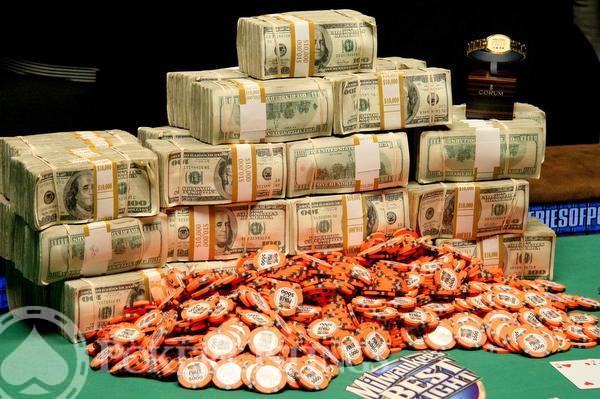
Now we know what it costs to play the game what do the numbers say on the winning side.
Win Rate Per Hour (WRPH)
A solid player will win about 15-30% of the flops seen. If we take the 10 flops per hour a solid player can expect to win about 1 to 3 pots per hour. For the savants remember this isn’t showdown hands won. A showdown is a hand played all the way to the river. A good showdown rate is 40-60%, meaning if we called down 5 hands per hour a good player will again win 2-3 of those hands per hour.
This is also where it gets bothersome with variance. It can be common to go 6 hours, sometimes days and never win a pot. Than on the flip side, win 3 hands in a row or 6 or 7 pots in a hour. But going back to the dreaded average, we're looking at 1-3 per hour and this where it gets tricky as we move on to average pot size.
Average Pot Size (APS)
An average pot that is called down past the river has about 13 big bets in it. Variance plays huge here, some pots are much smaller as they may not get to the river (6-8 big bets) and some can get much bigger (30-40 big bets) with crazy raises. But again if we stick to the average, 13 big bets works. This works out to $130 per pot in a $5-$10 game.
Totaling Up the Numbers in $5-$10 Limit Hold’em
Average Hourly Assets Average Hourly Cost Average Hourly Profit
$130 APS x 0 pots won= $0 per hour $310 -$310
$130 APS x 1 pot won= $130 per hour $310 -$180
$130 APS x 2 pots won= $260 per hour $310 -$50
$130 APS x 3 pots won= $390 per hour $310 +$80
$130 APS x 4 pots won= $520 per hour $310 +$210
As seen, if players can wins 2 pots hour they will, on average, lose $50 in a $5-$10 game. If they can win 3 pots it turns a profit of $80. The difference in that 10% or 1 pot looms large. If players can get up to 4 or more pots, which would be considered a hot streak, the profit rolls in. Keep in mind if players go an hour with no pots they will be down $410, that will test risk tolerance!
Factoring in 30% variance, 2 big pots (+$338) could get you to a break even or a small profit. On the flip side with small pots (+$91), it could take 3-4 wins to be your break even. Remember the house makes there $$ no matter what.
To be try and be more a little more exact in order to break even and maybe make a little money. Using these numbers a player would have to win the pot 25%-26% of the time over many hours of play. Can you overcome these odds? That’s a very tricky probability, with 1,326 starting hands in poker, one can see how winning 26% of the time can be quite difficult. At first glance these costs are staggering and there's a very good chance you'll lose. The cost has to be overcome or a player loses money. Good players are trying to get to the point where the smallest % of variance can swing their way to make money.
The numbers in are in and it just isn’t as easy as TV makes it look, grim perhaps. What wait a minute how can that be? Who in the world wants to lose money! That’s not the American Dream, it’s more of a poker nightmare! All of these calculations add up to play a game with an inherent cost of $310 per hour to try and make any money! “Whoa, Nellie”!! as Keith Jackson would say.
Most Average Joes are going to bring a $100-$300 to the game, play for 2-4 hours and likely walk out with no or far less money and have tales of bad beats and being outdrawn, but have had some fun. If they can catch a little variance and get on a hot streak, it’s possible to walk out a winner in the short term! If you’re playing with or for mortgage money, no kidding aside, I would seriously recommend a job at McDonald’s as the alternative! Play with what you can afford to lose.
If anything I hope I’ve pointed out poker is a very tricky game to beat, even a good player can have trouble breaking even. This is where the fun and challenge lie, getting the game to swing your way. If you don’t mind non-guaranteed income where you can go months without making money I wish you the best of luck on the felt. How can you try and swing variance your way, a topic for another time. :)
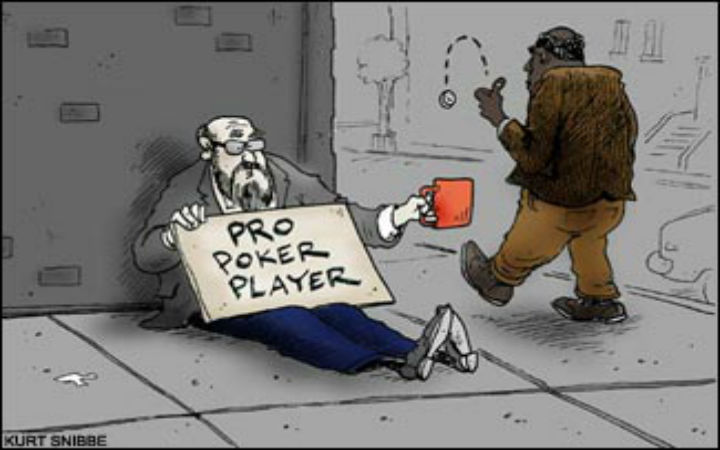
Total Average Hourly Cost of Different Fixed Limits: Avg Pot Size
$2-$4 hold em= $18BC+$10RC+$5DC+$100CC= $133 per hour $52
$3-$6 hold em= $27BC+$10RC+$5DC+$150CC= $192 per hour $78
$4-$8 hold em= $36BC+$10RC+$5DC+$200CC= $251 per hour $104
$5-$10 hold em= $45BC+$10RC+$5DC+$250CC= $310 per hour $130
$6-12 hold em= $54BC+$10RC+$5DC+$300CC= $369 per hour $156
$8-$16 hold em= $72BC+$10RC+$5DC+$400CC= $487 per hour $208
$10-$20 hold em=$90BC+$10RC+$5DC+$500CC= $605 per hour $260
$15-30 hold em= $95BC+$10RC+$5DC+$750CC= $860 per hour $390
$20-$40 hold em= $180BC+$10RC+$10DC+$1000CC= $1200 per hour $520
References and resources
http://regressing.deadspin.com/why-its-hard-for-poker-pros-to-make-a-living-playing-l-1526098295
http://sports.espn.go.com/espn/page2/story?page=lovinger/050111
http://www.pokernews.com/pokerterms/showdown.htm
http://www.jamesaltucher.com/2013/03/should-you-learn-poker-and-make-a-lot-of-money/
https://en.wikipedia.org/wiki/Poker_probability_(Texas_hold_%27em)
http://www.jamesaltucher.com/2013/03/should-you-learn-poker-and-make-a-lot-of-money/
https://www.quora.com/What-is-it-like-to-earn-a-living-through-poker


